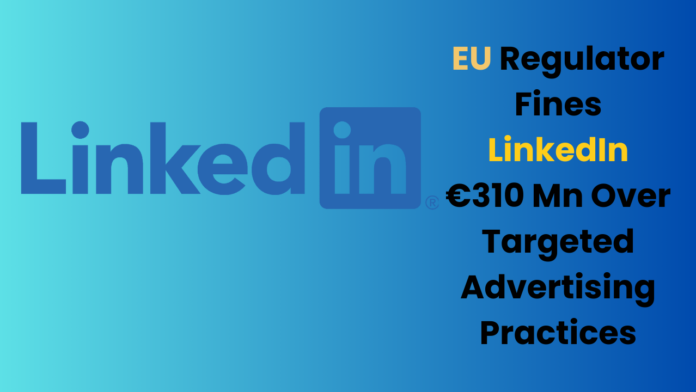The European Union’s lead privacy regulator has imposed a €310 million ($335 million) fine on Microsoft’s professional networking platform LinkedIn over violations related to targeted advertising practices. The fine, announced by the Irish Data Protection Commissioner (DPC) on Thursday, highlights growing scrutiny over how companies handle user data in the digital advertising space.
The DPC, which oversees privacy regulations for major U.S. tech companies operating within the EU, found LinkedIn in violation of the General Data Protection Regulation (GDPR), Europe’s stringent privacy law. The platform was found to have improperly handled user data in its targeted advertising efforts, raising concerns about privacy infringements.
LinkedIn, which is owned by Microsoft, was penalized for practices that allegedly did not fully comply with GDPR’s consent requirements, especially in how it used personal data for personalized ads without adequate transparency or user permission.
The fine is part of a broader effort by EU regulators to clamp down on privacy violations by major tech firms. Under GDPR, companies can face fines of up to 4% of their global revenue for non-compliance, and regulators have become increasingly assertive in enforcing these rules. The DPC acts as the EU’s lead regulator for many of the biggest U.S. tech companies due to their EU operations being based in Ireland.
In response, LinkedIn said it was reviewing the decision and working to ensure that its advertising practices align with regulatory expectations. “We are committed to safeguarding the privacy of our members and maintaining compliance with all relevant data protection laws,” a company spokesperson said.
The case underscores the ongoing challenges for tech companies navigating data protection regulations in the EU, particularly as regulators take a harder stance on how companies collect and use personal data for advertising purposes. Other major U.S. firms, including Meta and Google, have also faced significant penalties from the DPC in recent years.
As data privacy continues to be a focal point for regulators and users alike, tech companies are being pushed to reassess their business models and ensure greater transparency in their data handling practices.




